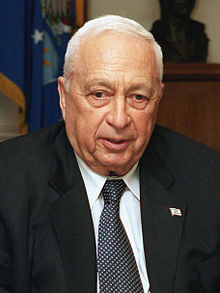

Prime Minister of Israel
Ariel Scheinermann 26 February 1928 Kfar Malal, Mandatory Palestine
11 January 2014(2014-01-11) (85) Ramat Gan, Israel
7 March 2001 – 14 April 2006
11th Prime Minister of Israel (2001-06) Ariel SharonSharon in 200211th Prime Minister of IsraelIn office 7 March 2001 – 14 April 2006PresidentMoshe KatsavDeputyEhud OlmertPreceded by Ehud BarakSucceeded by Ehud OlmertMinister of Foreign AffairsIn office 13 October 1998 – 6 June 1999Prime Minister Benjamin NetanyahuPreceded by David LevySucceeded by David LevyMinister of Energy and Water ResourcesIn office 8 July 1996 – 6 July 1999Prime Minister Benjamin NetanyahuPreceded by Yitzhak LevySucceeded by Eli SuissaMinister of Housing and ConstructionIn office 11 June 1990 – 13 July 1992Prime Minister Yitzhak ShamirPreceded by David LevySucceeded by Binyamin Ben-EliezerMinister of Industry, Trade and LabourIn office 13 September 1984 – 20 February 1990Prime Minister Shimon Peres (1984–86) Yitzhak Shamir (1986–90)Preceded by Gideon PattSucceeded by Moshe NissimMinister of DefenseIn office 5 August 1981 – 14 February 1983Prime Minister Menachem BeginPreceded by Menachem BeginSucceeded by Menachem BeginMinister of AgricultureIn office 20 June 1977 – 5 August 1981Prime Minister Menachem BeginPreceded by Aharon UzanSucceeded by Simha Erlich Personal detailsBornAriel Scheinermann (1928-02-26 ) 26 February 1928 Kfar Malal, Mandatory PalestineDied11 January 2014(2014-01-11) (aged 85) Ramat Gan, IsraelPolitical partyLiberal Party (1973–1974) Shlomtzion (1977) Likud (1977–2005) Kadima (2005–2014) Spouse(s)Margalit Sharon (m. 1953; died 1962 )Lily Sharon (m. 1963; died 2000 )Children3Alma materHebrew University of Jerusalem Tel Aviv UniversityProfessionMilitary officerSignatureMilitary serviceAllegiance IsraelBranch/service Haganah Israel Defense ForcesYears of service1948–1974Rank Aluf (Major general)UnitParatroopers Brigade Unit 101 Golani BrigadeCommandsSouthern Command Paratroopers Brigade Unit 101 Golani BrigadeBattles/warsIsraeli Independence War Suez Crisis Six-Day War Yom Kippur War Ehud Olmert serving as Acting Prime Minister from 4 January 2006 Ariel Sharon (Hebrew: אֲרִיאֵל שָׁרוֹן ; IPA: ( listen ) , Ariʼēl Sharōn, also known by his diminutive Arik, אָרִיק , born Ariel Scheinermann, אֲרִיאֵל שַׁיינֶרְמָן ; 26 February 1928 – 11 January 2014) was an Israeli general and politician who served as the 11th Prime Minister of Israel from March 2001 until April 2006. Sharon was a commander in the Israeli Army from its creation in 1948. As a soldier and then an officer, he participated prominently in the 1948 Palestine war, becoming a platoon commander in the Alexandroni Brigade and taking part in many battles, including Operation Bin Nun Alef. He was an instrumental figure in the creation of Unit 101 and the reprisal operations, as well as in the 1956 Suez Crisis, the Six-Day War of 1967, the War of Attrition, and the Yom-Kippur War of 1973. Yitzhak Rabin has called Sharon "the greatest field commander in our history". Upon retirement from the military, Sharon entered politics, joining the Likud party, and served in a number of ministerial posts in Likud-led governments in 1977–92 and 1996–99. As Minister of Defense, he directed the 1982 Lebanon War. An official enquiry found that he bore "personal responsibility" for the Sabra and Shatila massacre and recommended that he be removed as Defense Minister. His role in the massacre led to him being known as the "Butcher of Beirut" among Arabs. From the 1970s through to the 1990s, Sharon championed construction of Israeli settlements in the West Bank and Gaza Strip. He became the leader of the Likud in 2000, and was appointed Prime Minister of Israel after defeating Ehud Barak in the 2001 prime ministerial election. He served as Israel's prime minister from 2001 to 2006, during the Al-Aqsa Intifada. As Prime Minister, Sharon orchestrated Israel's unilateral disengagement from the Gaza Strip in 2004–05. Facing stiff opposition to this policy within the Likud, in November 2005 he left Likud to form a new party, Kadima. He had been expected to win the next election and was widely interpreted as planning on "clearing Israel out of most of the West Bank", in a series of unilateral withdrawals. After suffering a stroke on 4 January 2006, Sharon remained in a permanent vegetative state until his death in January 2014.

We use cookies
We use cookies and other tracking technologies to improve your browsing experience on our website, to show you personalized content and targeted ads, to analyze our website traffic, and to understand where our visitors are coming from. Privacy Policy.